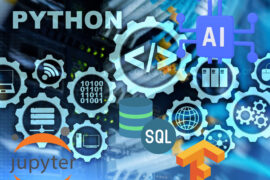
As an AI professional in 2023, the skills and tools you need to succeed are rapidly evolving. To stay on the cutting edge, you must continuously expand your knowledge and expertise across machine learning, deep learning, computer vision, natural language processing, and other core areas of artificial intelligence. Fluency in multiple programming languages, mastery of the latest modeling software, and access to vast datasets are also essential.
This blog provides an overview of the key skills and tools AI experts will rely on over the next year. We explore the concepts and techniques at the forefront of the field, highlight the programming languages and software enabling breakthroughs, and discuss resources for honing your craft. For those looking to advance their career in AI, we also spotlight opportunities to gain valuable experience through immersive AI fellowship programs.
The future is AI, and the future is now. It is up to you to gain the skills and tools to shape it.
Top Programming Languages and Frameworks for AI
To thrive as an AI professional in 2023, you must be proficient in several programming languages and frameworks. The most important are:
- Python: The dominant language for AI and machine learning. Used for everything from data analysis to training deep learning models. Libraries like NumPy, Pandas, matplotlib, SciPy, and TensorFlow make Python an ideal choice.
- SQL: The standard language for querying and manipulating data in relational databases. Essential for extracting and organizing the large datasets needed for machine learning and AI.
- PyTorch and TensorFlow: The two most popular open-source libraries for deep learning, neural networks, and machine learning. Used to build, train, and deploy machine learning models in Python.
- Scikit-learn: A Python library for traditional machine learning and data mining. Used for classification, regression, clustering, dimensionality reduction, and model selection.
- CUDA: CUDA is a parallel computing platform and programming model developed by NVIDIA for general computing on graphical processing units (GPUs). With CUDA, developers can dramatically speed up computing applications by harnessing the power of GPUs.
- Jupyter Notebooks: The Jupyter Notebook is an open-source web application that allows you to create and share documents that contain live code, equations, visualizations and narrative text. Uses include: data cleaning and transformation, numerical simulation, statistical modeling, data visualization, machine learning, and much more.
With a combination of technical expertise, programming skills, and hands-on experiences, AI professionals can achieve remarkable results and advance their careers. But it all starts with building a strong base in the fundamentals.
Fusemachines AI Fellowship Program is an ideal platform to kickstart your AI career in Latin America. Apply here today.
How to Develop Applied AI Skills
Learn Programming Languages
Mastering languages like Python, SQL, and R will allow you to analyze data and build AI models. Python is a popular, easy to learn language suited for machine learning and deep learning. SQL is essential for querying databases and manipulating data. R is a statistical language useful for data analysis and visualization.
Use Open Source Frameworks and Tools
Open source tools like TensorFlow, Keras, and PyTorch are popular for building neural networks and deep learning models. Scikit-learn is useful for traditional machine learning. OpenCV helps with computer vision tasks, and NLTK and SpaCy enable natural language processing.
Practice with Real-World Datasets
Applying your skills to actual data is key. Public datasets like MNIST, CIFAR-10, and ImageNet contain images for computer vision models. Massive datasets such as Common Crawl and Wikipedia are useful for NLP tasks. Work with data from your industry or area of interest.
Stay Up-To-Date with Trends
The field of AI is constantly changing. Keep up with trends like generative AI, reinforcement learning, and transformer models. Follow leaders in the AI field and study new research papers and breakthroughs. Take online courses to strengthen theoretical knowledge.
Consider Our AI Fellowship Program
Fusemachines AI Fellowship program provides structured, hands-on training for building applied AI skills. Our program covers generative AI, machine learning, deep learning, computer vision, NLP, and more through live online lectures and real-world capstone projects.
Fellows work closely with mentors and gain experience with tools like TensorFlow and PyTorch. Continuous practice and application of these skills prepares you to thrive as an AI professional in 2023 and beyond. Upon completion, fellows also receive a certificate to showcase their abilities. And the best part is that all selected students receive full scholarships covering everything from resources to certifications.
Apply for the AI Fellowship program here. To learn more about AI education programs by Fusemchines, click here.
Bottom Line
In 2023 and beyond, AI and its subfields will continue advancing rapidly. As an AI professional, keeping your skills and tools up to date is critical. While the field is constantly evolving, focusing on fundamentals like machine learning, deep learning, computer vision, and natural language processing will provide a strong foundation. Staying on top of trends like generative AI and large language modeling will keep you ahead of the curve.
Click here to explore the AI services and solutions from Fusemachines. Learn more about AI education programs by Fusemchines here.


